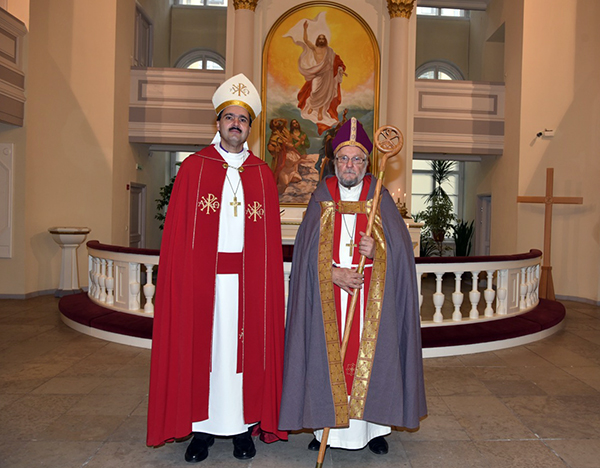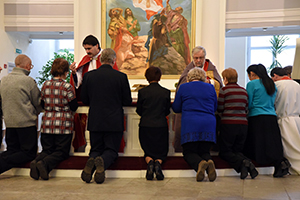
Siberian Evangelical Lutheran Church (SELC) Bishop Vsevolod Lytkin and Evangelical Lutheran Church of Ingria in Russia (ELCIR) Bishop Arri Kugappi.
by Rev. Alexey Streltsov
RUSSIA – In this time of disintegration of institutional Christianity in the countries of the developed world, it is noteworthy when the opposite trends mark the desire of confessional Lutheran Christians to abide in the unity of faith and love.
There was a time when the Lutheran Church of the old Russian Empire constituted one of the major Lutheran Churches worldwide. Well-known events of the communist revolution and atheistic purges of the 20th century have tragically changed the course of Christianity in that part of the world. Lutheranism in today’s Russia is relatively small and insignificant, only a shadow of what it once has been. However, even now the Lutherans in Russia trace their origin and history to that old Imperial Church. A sense of history is important for the Russian Lutherans. Along with that those Lutherans who are serious about their confessional subscription to the Holy Scripture and the Book of Concord naturally tend to not be in isolation from each other.
The Evangelical Lutheran Church of Ingria in Russia (ELCIR) and the Siberian Evangelical Lutheran Church (SELC) are two voices of the confessional Lutheran movement in Russia today. These are two sister churches and share certain parts of their history. The Ingrian Church is the older of the two, with some of her parishes dating back to the early 17th century. Being in origin a church focused mostly on serving ethnic Finns on the territory of Ingria (Ingermanland), the ECLIR has grown today to combine Finnish Ingrian tradition with an appeal to people from a variety of ethnic backgrounds. SELC, which formerly was a part of the Evangelical Lutheran Church in Estonia, has included people of various cultures from the beginning.

SELC Bishop Lytkin and ELCIR Bishop Kugappi serve as communion celebrants together.
SELC Bishop Vsevolod Lytkin and SELC Seminary Rector Alexey Streltsov recently visited the General Synod of ELCIR in October, the first such General Synod visit in 18 years. There has been remarkable progress in relationships between the two churches in recent years. Bishop Lytkin shared in the Eucharistic celebration with ELCIR Bishop Arri Kugappi at St Mary’s Church in St Petersburg, and preached for the service. Earlier this year, Rev. Alexey Streltsov preached at the service in the Moscow ELCIR parish of St. Peter and Paul in April and at Christ the Savior parish in Novosibirsk in November of this year.
Plans are being made for a joint seminar in spring of 2016 between the clergy of the Siberian deanery of ELCIR and SELC clergy. While instructor of the ELCIR Theological Institute, Dr. Sergey Isaev has been coming to the Theological Seminary of SELC in Novosibirsk for a number of years. And now, for the first time, Novosibirsk lecturers are scheduled to teach in Koltushy in 2016. ELCIR students residing in Siberia are likely to enroll at the seminary in Novosibirsk for the 2016-17 Academic year.
In short, some remarkable progress has been made within the last year. Bishop Kugappi observed at the Synod that such representation of the SELC at the Ingrian Synod was a major sign of unity of the two conservative Lutheran Churches in Russia. Bishop Lytkin states that never before in the history of the two churches were relations as close as they are now. He also expressed his admiration for the church’s strong witness of the declaration on the “Same sex relations” that was accepted at the ELCRI Synod. Their position is all the more admirable, he said, given the strong pressure from liberal European Churches that the ELCIR comes under for its confessional position on human sexuality.
Relations between the two Russian Lutheran churches have not always been as close as they are now. While conscientious Lutherans in both churches have hoped that obstacles would be overcome in the future, it is remarkable that such positive changes have occurred already in this generation. While there were historically challenges between the two churches, the fellowship between the sister churches was never broken: SELC seminary graduates served in the ELCIR parishes, there was interchange in hymnody, and in the work in the youth summer camps. Now relations between the two churches have grown to a strong new level.
There is an important lesson to learn here as well as great cause to give glory to God for the true unity in faith that comes only from Him. When people are serious about their confession and tradition, they naturally tend to join together in common witness for the truth. We are stronger together. In such a traditional society as Russia’s, it is extremely important to present Lutheran values in the public square not as a strange modernist antinomian phenomenon but as a historic Christian confession with clear emphasis on Christ and His Gospel, a serious attitude toward the commandments of God, and a respect for the liturgy and sacraments.
As Russian Lutherans move forward, they are hopeful that they will be able to keep faithful to their roots and present a viable alternative to apostate voices in which the voice of the Shepherd can no longer be recognized.
———————
Rev. Alexey Streltsov is Rector of the Siberian Evangelical Lutheran Church’s Lutheran Theological Seminary.
